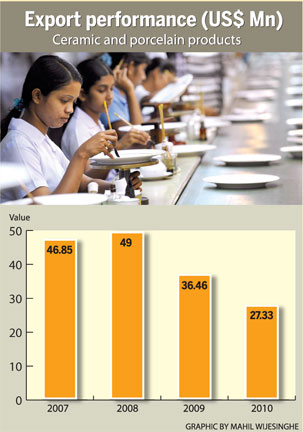|
Reduce tax on LPG gas, says SLCC chief:
Staggering energy and labour costs hit ceramics industry
By Lalin FERNANDOPULLE
The ceramics industry, a major foreign exchange earner faces a
daunting task to stay afloat due to staggering energy and labour costs,
an official of the Sri Lanka Ceramics Council (SLCC) said.
 He said Sri Lanka has to compete with low cost markets such as
Bangladesh, India and Vietnam which have gained an edge over Sri Lanka
in the global market. Sri Lanka is acclaimed for producing some of the
finest ceramic products in the world. The industry is several
centuries-old and provides direct livelihood to around 7,000 people
while another 7,500 are indirectly employed in the industry. He said Sri Lanka has to compete with low cost markets such as
Bangladesh, India and Vietnam which have gained an edge over Sri Lanka
in the global market. Sri Lanka is acclaimed for producing some of the
finest ceramic products in the world. The industry is several
centuries-old and provides direct livelihood to around 7,000 people
while another 7,500 are indirectly employed in the industry.
The income from ceramics exports in 2010/11 was Rs. 5,777, 460, 240
as against Rs. 5,044, 769, 499 earned in 2009/10.Porcelain tableware,
ornamental ware and glazed wall and floor tiles are exported to the USA,
Australia, Italy, Germany, UK, France, Canada, the Netherlands, Japan
and Singapore which are primary markets for Sri Lankan ceramic products.
SLCC President, Dayasiri Warnakulasooriya said the ceramics industry
has called for a reduction on the tax on LPG gas for the survival of the
ceramics industry.The tax on LPG gas on the ceramics industry has
impacted badly on the survival of the industry. The ceramics industry
consumes a high amount of LPG during the production process.
”The SLCC has requested for the direct purchase of LPG gas from the
Ceylon Petroleum Corporation to save the cost on taxes” Warnakulasooriya
said.Ceramics manufacturers pay a high price for LPG which increases
production cost.
The industry cannot compete in the international market and survive
in the business, with such high production costs.The ceramics industry
needs around 1,170 metric tons of LPG per month. A large number of small
ceramic factories have closed due to high energy prices and the
emergence of new markets with low labour cost, SLCC sources said.
Sri Lanka is rich in minerals, such as kaolin, ball clay, feldspar,
silica quartz and dolomite, which are used in the manufacture of
ceramics products. Sri Lanka’s ceramic industry is fortunate to enjoy an
abundance of raw materials, available at a very reasonable cost. The
excellent quality and purity of these materials contribute to the high
standard of the products, which are now of international repute. The
other distinct advantage enjoyed by Sri Lanka is the availability of a
highly skilled and literate workforce at very competitive wage rates. An
abundance of trained and gifted designers, chemists, technologists and
engineers provide a highly productive workforce.
|

